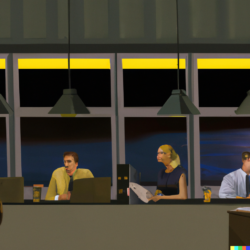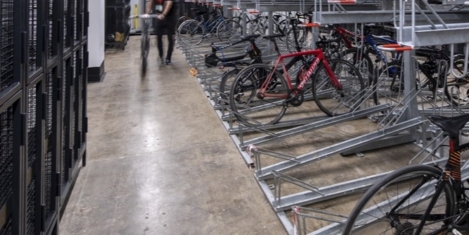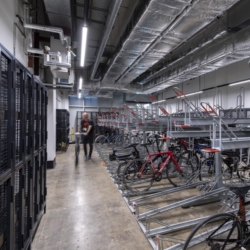September 26, 2024
The future of procurement: navigating a digital and strategic evolution
 In recent years, procurement has transformed from a back-office function to a strategic driver of business value. As global supply chains become more complex and businesses strive for greater efficiency, sustainability, and agility, the future of procurement is set to change even more dramatically. Technological innovations, data-driven insights, and a shift in priorities are reshaping the way organizations manage their sourcing, purchasing, and supplier relationships.
In recent years, procurement has transformed from a back-office function to a strategic driver of business value. As global supply chains become more complex and businesses strive for greater efficiency, sustainability, and agility, the future of procurement is set to change even more dramatically. Technological innovations, data-driven insights, and a shift in priorities are reshaping the way organizations manage their sourcing, purchasing, and supplier relationships.
This article explores the future of procurement, focusing on the trends, technologies, and strategies that will define this critical business function in the coming years.
- The Rise of Digital Procurement
One of the most significant trends shaping the future of procurement is digital transformation. Traditional procurement processes, which were often manual and time-consuming, are being replaced by automated, digital solutions. Technologies such as artificial intelligence (AI), machine learning, robotic process automation (RPA) are streamlining procurement workflows, enhancing transparency, and improving decision-making.
Artificial Intelligence (AI) and process orchestration are transforming procurement by streamlining complex tasks and improving overall efficiency. As highlighted in Tonkean’s blog, AI can eliminate time-consuming manual work like managing approvals, chasing stakeholders, and navigating complex systems. The use of AI-powered orchestration allows procurement teams to unify systems, automate routine tasks, and facilitate collaboration. This leads to faster cycle times, better process adoption, and more time for high-value strategic work, ultimately positioning procurement as a key business partner.
Key Areas of Digital Transformation:
– Automation of Routine Tasks: Tasks like purchase order creation, invoice processing, and supplier matching can now be fully automated, allowing procurement professionals to focus on more strategic initiatives.
– AI-Driven Insights: AI can analyze vast amounts of data to identify trends, predict demand, and assess risks, enabling more informed decision-making.
Impact:
The adoption of digital technologies will lead to faster procurement cycles, reduced errors, and significant cost savings. Procurement professionals will need to adapt to new tools and skills, such as data analytics and AI-powered decision-making, to remain competitive.
- Data-Driven Decision-Making
Data is becoming the new currency in procurement. With the vast amount of data now available through various channels—supplier data, market trends, and performance analytics—procurement teams have the opportunity to make more strategic decisions. Advanced analytics tools are enabling organizations to turn raw data into actionable insights, optimizing procurement strategies for cost reduction, risk management, and supplier performance.
How Data Impacts Procurement:
– Supplier Relationship Management: Data analytics can help procurement teams evaluate supplier performance, identify key areas of improvement, and foster stronger, more collaborative relationships.
– Risk Mitigation: Predictive analytics can forecast potential supply chain disruptions, allowing organizations to proactively manage risks such as supplier bankruptcies, geopolitical instability, or natural disasters.
– Cost Optimization: By analyzing purchasing patterns and market trends, procurement professionals can negotiate better contracts, reduce maverick spending, and ensure cost savings across the board.
Impact:
The ability to harness and analyze data will be critical for the future of procurement. Organizations that leverage data to drive decisions will be able to build more resilient and cost-efficient supply chains.
- Sustainability and Ethical Sourcing
As consumers, investors, and regulators increasingly prioritize sustainability, procurement teams must align with corporate social responsibility (CSR) and environmental, social, and governance (ESG) goals. This shift means that procurement will play a central role in ensuring that businesses source goods and services from environmentally and ethically responsible suppliers.
Key Areas of Focus:
– Sustainable Sourcing: Procurement teams will need to ensure that suppliers adhere to environmentally friendly practices, such as reducing carbon emissions and minimizing waste.
– Ethical Labor Practices: Ensuring that suppliers comply with labor laws, prevent human rights abuses, and foster fair working conditions will become a priority.
– Circular Economy: Procurement will increasingly focus on sourcing products that can be recycled, reused, or repurposed, contributing to a more circular economy.
Impact:
Sustainability will no longer be optional for procurement teams. To remain competitive and compliant, procurement professionals must prioritize ethical and sustainable practices in their sourcing strategies.
- Supplier Collaboration and Innovation
In the future, procurement will shift from a transactional function to one that focuses on collaboration and innovation. Instead of simply managing suppliers, procurement teams will work more closely with them to co-create value and drive innovation. This shift will require a new approach to supplier relationships, one that emphasizes trust, transparency, and mutual benefit.
Key Changes:
– Supplier Collaboration: Rather than viewing suppliers as vendors, procurement teams will treat them as partners in innovation. This collaboration can lead to the development of new products, improved processes, and shared efficiencies.
– Long-Term Relationships: Procurement will focus on building long-term, strategic partnerships with suppliers, ensuring that both parties can innovate and grow together.
– Innovation Hubs: Some organizations may establish innovation hubs or programs where procurement teams and suppliers collaborate on research and development, bringing cutting-edge products and services to market faster.
Impact:
Collaboration with suppliers will become a competitive advantage, enabling organizations to innovate, adapt to market changes, and deliver more value to customers.
- The Strategic Role of Procurement
As procurement evolves, its role within the organization will become more strategic. Instead of being seen as a cost-saving function, procurement will increasingly contribute to business growth, innovation, and resilience. This shift will require procurement professionals to develop new skills and capabilities, such as strategic thinking, cross-functional collaboration, and leadership.
Key Areas for Strategic Focus:
– Procurement as a Value Creator: Procurement will move beyond cost-cutting to create value through innovation, risk management, and sustainability.
– Cross-Functional Collaboration: Procurement teams will work more closely with other departments, such as R&D, marketing, and finance, to align procurement strategies with broader business objectives.
– Leadership and Influence: Procurement leaders will need to influence key stakeholders and contribute to strategic decision-making at the executive level.
Impact:
The strategic elevation of procurement will lead to greater influence within organizations, enabling procurement professionals to drive business success through innovation, resilience, and sustainability.
Conclusion
The future of procurement is one of transformation and opportunity. As digital technologies, data-driven decision-making, sustainability, and supplier collaboration reshape the procurement landscape, professionals in this field will need to adapt and embrace new skills and strategies. By doing so, they will not only optimize procurement processes but also contribute to the long-term success of their organizations.
Procurement is no longer just about sourcing the best deal—it’s about building resilient, ethical, and innovative supply chains that drive business



































September 18, 2024
You get what you give at the CoreNet Global Summit 2024 in Berlin
by Jo Sutherland • Comment, Facilities management, Property, Wellbeing